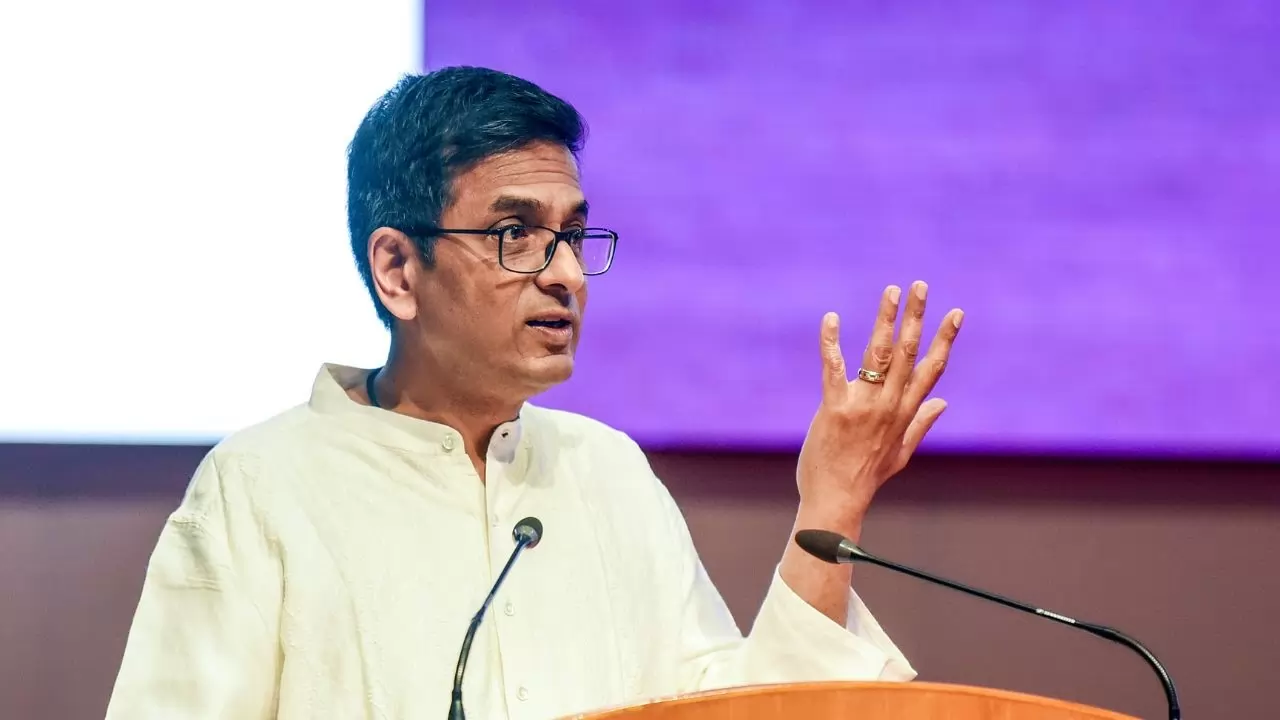
DY Chandrachud (ANI)
The recently retired Chief Justice of India, Justice Chandrachud has weighed in on the increasing levels of air pollution in the national capital Delhi, with many of its residents, including himself, opting to forgo their daily morning walks as a measure to safeguard against potential hazards to their health.
The former Supreme Court judge in an exclusive interview with ANI noted that he is enthused to see people repose their faith in the judiciary system to find a solution to the menace that he attributes to "multidimensional issues" including farm fires and rise in vehicular traffic. Speaking to ANI in an exclusive interview the former CJI said, "It's great that people have this kind of faith in the court system. But I think when we deal with issues such as pollution in Delhi, the fact that, you know, everybody's talking about it for a change in the last several years is, is part of the answer to the problem. Because the real problem arises when people just accept whatever happens in society as a new normal. And they don't speak about it. They don't write about it. They don't talk about it. The very fact that everyone is engaged on this issue itself is the first step in finding a solution to this problem."
The former CJI further said that the courts cannot take over the core policymaking role, which is for expert agencies to handle. "Now, you know, the point is that there are two different aspects of the matter. First, you have the role of policymakers, namely the government, and the expert agencies of the government, and then you have the role of the courts. None can in that sense be complete without the other. When courts step into this area, obviously courts cannot take over the core policymaking role, which is for expert agencies to handle. What courts can ensure is to ensure that the processes are being undertaken. Are you applying your mind to this? For instance, we had the graded action plan. Now that was introduced as a result of the intervention of the court the sense that then we lay down processes and systems that if pollution crosses a certain level, these are the steps which you have to take. So you institutionalize processes and the response to pollution does not become ad hoc," he said.
When asked if is there a need to have more judicial intervention in the matter, Justice Chandrachud said that "multidimensional issues" including farm fires, the number of vehicles in the city, new construction etc have to be taken into consideration. "I also understand the limits of judicial review. And it's very important for judges to understand the limits of their function. Because what happens very often is that when you step into a problem, particularly a problem as complex as this, which is not a problem relating to one source of pollution, like say, one thermal power plant, or one polluting industry, those are typically areas which courts can work on very well. But you are dealing with a problem which has multidimensional issues involved. You have farm fires, you have the number of vehicles in the city, you have new construction, you have changes in cropping patterns, and climate change in general as well. So these are issues in that sense which are extraordinarily complex. So courts have to step into the area, move the authorities along and tell them, hey, what are you doing?," the former CJI said.
Pointing out that the judiciary has done a lot of good work in the environmental area in India, he said noting that the role of the courts is to nudge the authorites to take decisions. "What are the steps that you are taking to deal with today's problems? What are you envisioning for the next year? What steps do you want to take? So very often the role of judicial review is to push things along as opposed to merely taking decisions on your own. Another problem I think which we need to understand is that when courts take decisions, we are essentially not accountable to the people in a direct sense. Obviously, we are accountable to the Constitution. as judges. But so courts are not in that sense either accountable to the electorate or to the people at large. We, as judges, they perform roles of, you know, enforcing constitutional rights. Now, a lot of good work in the environmental area in India has been done by the judiciary," the former CJI said.
Justice Chandrachud pointed out that Delhi is governed by a very different "constitutional distribution" of powers.
The former Supreme Court justice had previously said that he had stopped going out for morning walks on the recommendation of his doctor who, he said advised him to avoid morning walks due to the poor air quality, which could lead to respiratory issues. Meanwhile, the national capital on Tuesday registered a "Very Poor" air quality index, which is a slight improvement from the past week which saw the city reeling under 'Severe' air quality, as per the Central Pollution Control Board. At 7 am today, the Air Quality Index (AQI) was recorded at 382, falling under the 'very poor' category, according to the Central Pollution Control Board.
The Directorate of Education of the Delhi Government had on November 25 issued directions to all schools in the national capital to follow CAQM's order. This decision follows the Supreme Court's order dated November 25 in the case of MC Mehta vs. Union of India, directing the CAQM (Commission of Air Quality Management) to review GRAP- 4 (Graded Response Action Plan) restrictions put in place to curb air pollution in Delhi-NCR,in light of their impact on education. The court emphasised the need to prioritise education while raising several concerns.





Copyright © 2026 Top Indian News
